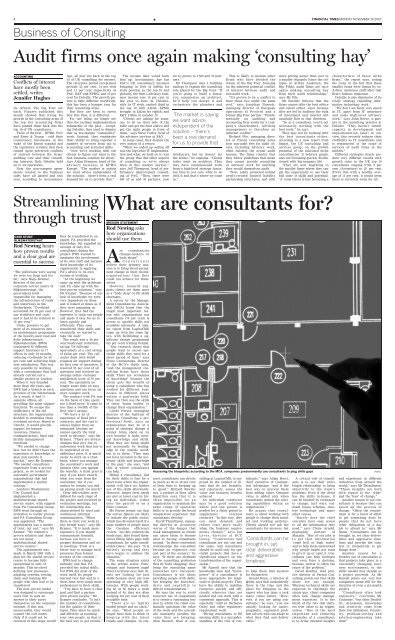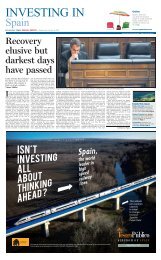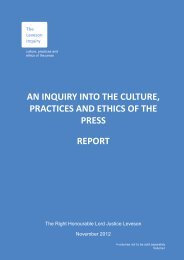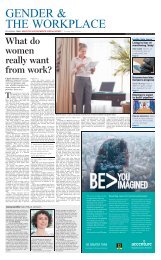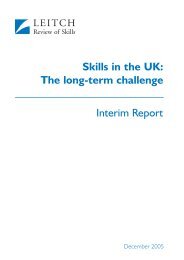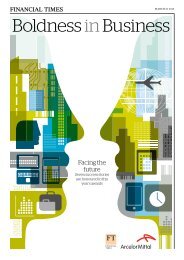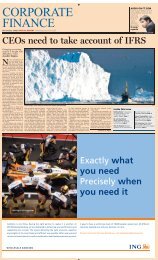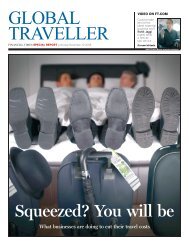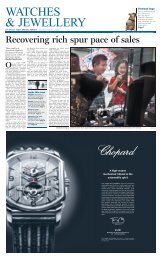What are consultants for? - Financial Times - FT.com
What are consultants for? - Financial Times - FT.com
What are consultants for? - Financial Times - FT.com
You also want an ePaper? Increase the reach of your titles
YUMPU automatically turns print PDFs into web optimized ePapers that Google loves.
4 ★ FINANCIALTIMESMONDAYNOVEMBER 19 2007<br />
Business of Consulting<br />
Audit firms once again making ‘consulting hay’<br />
ACCOUNTING<br />
Conflicts of interest<br />
have mostly been<br />
settled, writes<br />
Jennifer Hughes<br />
Its official: The Big Four <strong>are</strong><br />
back. Figures published this<br />
month showed that strong fee<br />
growth at the consulting arms of<br />
the top tier accounting firms<br />
have pushed them back into the<br />
top 10 of UK consultancy.<br />
Three of the four – KPMG, PwC<br />
and Ernst & Young – sold their<br />
consultancy businesses in the<br />
wake of the Enron scandal and<br />
the regulatory scrutiny that then<br />
turned upon perceived conflicts<br />
of interest between the firms’<br />
auditing core and their consulting<br />
interests. Only Deloitte held<br />
on to its operations.<br />
Now, the non-<strong>com</strong>pete agreements<br />
related to the business<br />
sales have all passed and this<br />
year, according to Accountancy<br />
Age, all four <strong>are</strong> back in the top<br />
10 of UK consulting fee earners.<br />
The returnees posted exceptional<br />
growth: 25 per cent, 14 per cent<br />
and 11 per cent respectively at<br />
PwC, E&Y and KPMG, and 10 per<br />
cent <strong>for</strong> Deloitte. The growth picture<br />
is little different worldwide;<br />
this has been a bumper year <strong>for</strong><br />
their consulting arms.<br />
But they <strong>are</strong> keen to stress<br />
how this time, it is different.<br />
For one thing, no longer <strong>are</strong><br />
they the systems implementation<br />
behemoths of the past – excepting<br />
Deloitte, they tend to dismiss<br />
that as low-margin “<strong>com</strong>modity”<br />
work. Instead, they emphasise<br />
their ability to bring together a<br />
number of services from tax to<br />
accounting and actuarial skills.<br />
“Now we’re working with our<br />
clients to figure out what is the<br />
best business solution <strong>for</strong> them,”<br />
says Aidan Brennan, head of the<br />
advisory business at KPMG<br />
Europe. “The market is saying<br />
we want advice independent of<br />
the solution – there’s been a real<br />
demand <strong>for</strong> us to provide that.”<br />
Streamlining<br />
through trust<br />
CASESTUDY<br />
RIJKSWATERSTAAT<br />
Rod Newing hears<br />
how proven results<br />
and a clear goal <strong>are</strong><br />
essential to success<br />
“The politicians were saying<br />
we were too large and too<br />
fat,” says Hugo Kramer,<br />
director of the new<br />
corporate service centre of<br />
Rijkswaterstaat, the<br />
government body<br />
responsible <strong>for</strong> managing<br />
the infrastructure of roads<br />
and waterways in the<br />
Netherlands. “Overhead<br />
accounted <strong>for</strong> 25 per cent of<br />
our work<strong>for</strong>ce and costs<br />
and it had to be reduced to<br />
15 per cent.”<br />
Under pressure to put<br />
more of its resources into<br />
its maintenance programme<br />
of the heavily-used road and<br />
dyke infrastructure,<br />
Rijkswaterstaat (RWS)<br />
centralised 85 different<br />
support functions in 17<br />
offices in only 18 months,<br />
reducing overheads by 40<br />
per cent and achieving high<br />
user satisfaction. This was<br />
only possible by working<br />
with a consultancy that had<br />
already carried out a<br />
similar project in London.<br />
When it was founded<br />
more than 200 years ago,<br />
RWS had a branch in each<br />
province of the Netherlands.<br />
As a result, it had 17<br />
separate offices, all<br />
providing the same support<br />
functions. To escape the<br />
inefficiency of the old<br />
structure, the organisation<br />
decided to centralise these<br />
overhead services. Based in<br />
Utrecht, it would provide<br />
support <strong>for</strong> human<br />
resources, finance,<br />
<strong>com</strong>munications, legal and<br />
facility management<br />
functions.<br />
“We needed to change<br />
fast, but we didn’t have the<br />
experience or knowledge to<br />
plan and execute it<br />
quickly,” says Mr Kramer.<br />
“We needed consultancy<br />
experience from a proven<br />
project, so we looked <strong>for</strong><br />
successful government<br />
organisations that had<br />
implemented a similar<br />
solution.”<br />
London’s Westminster<br />
City Council had<br />
implemented a<br />
multifunctional sh<strong>are</strong>d<br />
service centre, with support<br />
from PA Consulting Group.<br />
RWS went through an<br />
invitation to tender process<br />
and PA Consulting Group<br />
was appointed. “The<br />
appointment was a matter<br />
of trust, not cost,” says Mr<br />
Kramer. “We wanted a<br />
proven solution and there<br />
<strong>are</strong> not many<br />
multifunctional sh<strong>are</strong>d<br />
service centres.”<br />
The appointment was<br />
made in March 2004 with a<br />
plan <strong>for</strong> the sh<strong>are</strong>d service<br />
centre to be<strong>com</strong>e fully<br />
operational in only 18<br />
months. This involved<br />
defining new processes,<br />
adapting systems, testing<br />
them and training 800<br />
people who then had to be<br />
transferred.<br />
The new service model<br />
was designed to encourage<br />
users first to seek an<br />
answer to their query<br />
themselves on the corporate<br />
intranet. If this was<br />
unsuccessful, they would<br />
contact the call centre.<br />
Only if it could not be<br />
resolved at this stage would<br />
they be transferred to an<br />
expert. PA provided the<br />
knowledge, but supplied an<br />
average of only five<br />
<strong>consultants</strong> during the<br />
project. RWS wanted to<br />
maximise the involvement<br />
of its own staff and harness<br />
their knowledge of its<br />
organisation in applying<br />
PA’s advice to its own<br />
system of working.<br />
“At the beginning we<br />
came up with the problems<br />
and PA came up with the<br />
best proven solutions,” says<br />
Mr Kramer. “Because of our<br />
lack of knowledge we were<br />
very dependent on them<br />
and it looked at times as if<br />
they were managing us.<br />
However, they had the<br />
expertise to train our people<br />
and made it easy <strong>for</strong> us to<br />
learn quickly and<br />
efficiently. They soon<br />
transferred their skills and<br />
eventually we started to<br />
take the lead.”<br />
The result was a 40 per<br />
cent headcount reduction,<br />
saving 750 full-time<br />
equivalents at a cost saving<br />
of €45m per year. The call<br />
centre dealt with 50,000<br />
requests <strong>for</strong> support during<br />
its first year of operation. It<br />
resolved 85 per cent of all<br />
questions and received an<br />
average online customer<br />
satisfaction score of 70 per<br />
cent. The specialists no<br />
longer waste time on easy<br />
questions and can focus on<br />
more <strong>com</strong>plex work.<br />
The contract with PA was<br />
on the basis of time spent,<br />
not a fixed price. It came to<br />
less than a twelfth of the<br />
first year’s saving.<br />
“We have a lot of<br />
experience of fixed price<br />
contracts, and the cost is<br />
always higher than we<br />
estimated, because we<br />
cannot specify the total<br />
work in advance,” says Mr<br />
Kramer. “There <strong>are</strong> always<br />
changes that give rise to<br />
un<strong>for</strong>eseen work that has to<br />
be negotiated at an<br />
additional price. It is much<br />
easier to work on a trust<br />
basis, where you manage<br />
the consultant’s work and<br />
balance their cost against<br />
the benefits. A fixed price is<br />
easy if you know exactly<br />
what you want from the<br />
consultant, but if you<br />
cannot be certain you end<br />
up paying much too much.”<br />
Clear deliverables were<br />
defined <strong>for</strong> each stage of<br />
the project and reviewed in<br />
evaluation meetings, but<br />
the relationship was<br />
characterised by trust and<br />
continuous in<strong>for</strong>mal<br />
<strong>com</strong>munication. “When<br />
there is trust you work in<br />
less <strong>for</strong>mal ways,” says Mr<br />
Kramer. “It is much more<br />
expensive if you mainly<br />
<strong>com</strong>municate <strong>for</strong>mally,<br />
because you have to<br />
prep<strong>are</strong> documents and sit<br />
in meetings. Trust is a<br />
better way to manage such<br />
processes than <strong>for</strong>mal<br />
reviews of the contract.”<br />
RWS had to change<br />
radically and fast. PA<br />
provided the initial skills,<br />
but RWS did most of the<br />
work itself. Its people<br />
learned very fast and in a<br />
short time were much more<br />
professional in their skills.<br />
“You have to have a clear<br />
goal and find a partner<br />
with proven results,” Mr<br />
Kramer concludes. “It isn’t<br />
the number of <strong>consultants</strong>,<br />
but the quality of their<br />
input. They must be quick<br />
and effective at teaching<br />
your own people, as that is<br />
the best way to get results.”<br />
The in<strong>com</strong>e data would back<br />
that up. Accountancy Age has<br />
PwC’s UK consultancy business<br />
bringing in fees of £289m <strong>for</strong><br />
sixth position in the top 10 and<br />
globally, the firm’s advisory business<br />
in<strong>com</strong>e rose 15 per cent in<br />
the year to June 30. Deloitte,<br />
with its IT work, ranked third in<br />
the top 10 with £403m. KPMG<br />
brought in £243m <strong>for</strong> eighth, and<br />
E&Y £198m at number 10.<br />
“Clients <strong>are</strong> asking <strong>for</strong> someone<br />
to sit on their side of the<br />
table and get the best advice and<br />
put the right people in front of<br />
them,” says Steve Varley, head of<br />
the advisory services at E&Y.<br />
In some cases, they dispute the<br />
very notion of a return.<br />
“<strong>What</strong> we ended up selling off<br />
was the big-ticket IT implementation<br />
and what we held on to was<br />
the group that did other aspects<br />
of consulting, so we’ve always<br />
been in this market anyway,”<br />
says Jeff Thompson, head of per<strong>for</strong>mance<br />
improvement consulting<br />
at PwC. “Then, there were<br />
500 of us and 30 partners, now<br />
we’ve grown to 1,500 and 70 partners.”<br />
Mr Thompson uses a building<br />
analogy to explain the consulting<br />
role played by the Big Four: “If<br />
you’re going to build a house,<br />
you <strong>com</strong>mission an architect,<br />
he’ll help you design it and<br />
orchestrate the plumbers and<br />
‘The market is saying<br />
we want advice<br />
independent of the<br />
solution – there’s<br />
been a real demand<br />
<strong>for</strong> us to provide that’<br />
bricklayers, but he doesn’t lay<br />
the bricks,” he explains. “Clients<br />
today want an architect. They<br />
may have <strong>com</strong>missioned work<br />
from a high-level strategy house,<br />
but they’re not sure what to do<br />
with it and that’s where we <strong>com</strong>e<br />
in.”<br />
This is likely to incense other<br />
firms who have derided the<br />
return of the Big Four, focusing<br />
on the inherent potential conflict<br />
of interest between audit and<br />
non-audit work.<br />
“It’s proven to be a conflict to<br />
have those two under the same<br />
roof,” says Jonathan Burnett,<br />
managing director of European<br />
operations at Protiviti and a<br />
<strong>for</strong>mer Big Four partner. “Fundamentally<br />
an auditing and<br />
accounting firm works <strong>for</strong> a <strong>com</strong>pany’s<br />
sh<strong>are</strong>holders. Advising<br />
management is there<strong>for</strong>e an<br />
inherent conflict.”<br />
Richard Pile, managing director<br />
at Parson Consulting notes<br />
how non-audit fees <strong>for</strong> audit clients,<br />
including advisory work,<br />
often outstrip the actual audit<br />
in<strong>com</strong>e. The firms counter that<br />
they follow guidelines that mean<br />
they cannot provide consulting<br />
or advisory work <strong>for</strong> anything<br />
they would themselves audit.<br />
“Now, safely protected behind<br />
newly-created limited liability<br />
partnership structures, and with<br />
more pricing power than ever in<br />
a smaller oligopoly [since the collapse<br />
of Arthur Andersen, the<br />
Big Fifth], audit firms <strong>are</strong> once<br />
again making consulting hay<br />
from their audit relationships,”<br />
says Mr Pile.<br />
Mr Burnett believes that the<br />
firms cannot offer the best advice<br />
and talent either, since because<br />
they <strong>are</strong> led by auditors the bulk<br />
of investment and interest will<br />
naturally flow in that direction.<br />
“So as a consultant, you’re not<br />
necessarily working with the<br />
best tools,” he says.<br />
They may not be working with<br />
the best <strong>consultants</strong> either,<br />
according to a new report from<br />
Smart, the US consulting and<br />
services group, on the growth<br />
potential of the mid-sized niche<br />
consultancies. It believes graduates<br />
<strong>are</strong> be<strong>com</strong>ing quickly disillusioned<br />
with big-<strong>com</strong>pany life.<br />
“They <strong>are</strong> now migrating to<br />
the smaller firms where they can<br />
get the opportunity to use their<br />
full suite of skills and potential.<br />
‘A’ team talent is fast be<strong>com</strong>ing a<br />
<strong>What</strong> <strong>are</strong> <strong>consultants</strong> <strong>for</strong>?<br />
MISSIONSTATEMENT<br />
Rod Newing asks<br />
how organisations<br />
should use them<br />
Are consultancies<br />
change-makers or<br />
body shops?<br />
C o n s u l t a n t s<br />
believe their primary mission<br />
is to bring about permanent<br />
change in their clients’<br />
organisations that they<br />
could not achieve <strong>for</strong> themselves.<br />
However, research suggests<br />
clients see them more<br />
as a “body shop” to fill skills<br />
shortages.<br />
A survey by the Management<br />
Consultancies Association<br />
(MCA) found that the<br />
single most important reason<br />
why organisations use<br />
<strong>consultants</strong> (70 per cent) is<br />
access to specific skills not<br />
available internally. A similar<br />
report from LogicaCMG<br />
came up with the same figure,<br />
with facilitating a significant<br />
change programme<br />
(65 per cent) trailing behind.<br />
“Our research shows that<br />
people want to access specialist<br />
skills they need <strong>for</strong> a<br />
short period of time,” says<br />
Fiona Czerniawska, director<br />
of the MCA’s think tank,<br />
“and the management consulting<br />
firms have those<br />
skills. There <strong>are</strong> ‘economies<br />
of knowledge’ because the<br />
client gets the benefit of<br />
using a consultant who has<br />
worked <strong>for</strong> different businesses<br />
in different places<br />
within a particular field.<br />
They can then use the skills<br />
of these ‘warm bodies’ to<br />
change their organisation.”<br />
Lynda Purser, managing<br />
director of the Institute of<br />
Business Consulting, a professional<br />
body, says an<br />
organisation may be at a<br />
point of strategic change it<br />
cannot bring about on its<br />
own because it lacks internal<br />
knowledge and skills.<br />
<strong>What</strong> they <strong>are</strong> doing might<br />
not necessarily be leadingedge<br />
in the outside world,<br />
but is to them. “They may<br />
not have invested in the necessary<br />
skills and knowledge<br />
in the past,” she says, “and<br />
this is where <strong>consultants</strong><br />
can help.”<br />
Hiring a consultancy just<br />
<strong>for</strong> their skills is fine <strong>for</strong> a<br />
short term where the organisation<br />
will have no further<br />
use of the skills afterwards.<br />
However, longer term needs<br />
<strong>are</strong> met at lower cost by hiring<br />
an individual, either<br />
onto the payroll or on a<br />
finite contract.<br />
Ms Purser points out that<br />
the survey figures <strong>are</strong> likely<br />
to include the public sector,<br />
which has divested itself of a<br />
huge number of people since<br />
the Gershon efficiency<br />
review. “As they reduced the<br />
headcount, they found themselves<br />
filling skills gaps with<br />
<strong>consultants</strong> <strong>for</strong> quite considerable<br />
times,” she says. “It is<br />
entirely wrong and they<br />
have begun to address the<br />
situation.”<br />
The same situation exists<br />
in the private sector. Futurologist<br />
and business angel<br />
Peter Cochrane says that clients<br />
<strong>are</strong> looking <strong>for</strong> just<br />
skills because most <strong>are</strong> now<br />
operating at very high efficiencies.<br />
With people working<br />
50 or 60 hours a week<br />
instead of 40, they <strong>are</strong> often<br />
working 110 per cent of their<br />
available time.<br />
“There <strong>are</strong> no lightly<br />
loaded people and no slack,”<br />
he says. “Most people no<br />
longer have time to think or<br />
keep-up with the latest<br />
trends and changes. In con-<br />
trast, <strong>consultants</strong> can devote<br />
as much as 30 or 40 per cent<br />
of their time to keeping up<br />
to speed.” Richard Rawlinson,<br />
a partner at Booz Allen<br />
Hamilton says that it is<br />
often impossible <strong>for</strong> an<br />
organisation to maintain the<br />
same range of specialist<br />
skills or to provide the broad<br />
<strong>com</strong>parative experience that<br />
<strong>consultants</strong> develop.<br />
David Thomlinson, managing<br />
director at Accenture<br />
warns of the danger that<br />
weak management at clients<br />
can cause them to be<strong>com</strong>e<br />
used to having <strong>consultants</strong><br />
around. “In these convenient<br />
relationships the consultant<br />
be<strong>com</strong>e an expensive cost<br />
and part of the scenery,” he<br />
says. “If there <strong>are</strong> elements<br />
of the consulting profession<br />
that do ‘body shopping,’ they<br />
bring the consulting name<br />
somewhat into disrepute.<br />
Consultancy is not about<br />
providing people with skills,<br />
but bringing the knowhow,<br />
drive and capability to<br />
deliver trans<strong>for</strong>mation.”<br />
He says the way to avoid<br />
incorrect use of <strong>consultants</strong><br />
is to create a continuing tension<br />
in which the client continually<br />
questions the value<br />
of the work and the consultant<br />
constantly justifies the<br />
value they <strong>are</strong> bringing.<br />
Alan Russell, head of con-<br />
sulting at LogicaCMG, is surprised<br />
by the number of clients<br />
that do not <strong>for</strong>mally,<br />
and rigorously, assess the<br />
value and business benefits<br />
achieved.<br />
An individual contractor<br />
may be a good solution<br />
where just one person is<br />
needed <strong>for</strong> a finite period to<br />
supplement internal<br />
resources. “In this way, they<br />
can meet demand and<br />
reduce costs more easily<br />
when the business requirements<br />
change,” says Ian<br />
Lever, director at NCC<br />
Group. “Contractors and<br />
<strong>consultants</strong> <strong>are</strong> not one and<br />
the same, and <strong>consultants</strong><br />
should be used only <strong>for</strong> specialist<br />
projects that have a<br />
significant impact on the<br />
trans<strong>for</strong>mation of the organisation.”<br />
Mr Russell says that the<br />
knowledge base and “horsepower”<br />
of a consultancy is<br />
more appropriate <strong>for</strong> largescale<br />
or global projects. They<br />
have the ability to mobilise<br />
resources quickly and efficiently<br />
wherever they <strong>are</strong><br />
needed and can work with a<br />
consistent approach. This is<br />
especially valid in Sarbanes<br />
Oxley and other regulatory<br />
requirement work.<br />
“Hiring <strong>consultants</strong> to fill<br />
missing skills is a misunderstanding<br />
of the role of con-<br />
sultants,” says Aidan Bocci,<br />
chief executive of Commercial<br />
Advantage, “and is the<br />
best way to prevent them<br />
from adding value. Genuine<br />
value is added only when<br />
<strong>consultants</strong> unlock the existing<br />
capabilities within an<br />
organisation.”<br />
He argues that consultancy<br />
is about working with<br />
people to change their mindset<br />
and working patterns.<br />
Clients should not ask the<br />
<strong>consultants</strong> <strong>for</strong> answers, but<br />
to help them find answers<br />
<strong>for</strong> themselves.<br />
Gerald Dunn, a director at<br />
Qedis, says that undoubtedly<br />
there is the time and the<br />
place <strong>for</strong> bringing in the<br />
expert who has done a task<br />
many times be<strong>for</strong>e. “However,<br />
if you <strong>are</strong> using <strong>consultants</strong>,”<br />
he says, “you <strong>are</strong><br />
usually looking <strong>for</strong> smart,<br />
pragmatic, organised problem<br />
solvers who can adapt to<br />
what they find and deliver<br />
value.”<br />
A critical role of <strong>consultants</strong><br />
is to use their arm’s<br />
length relationship to bring<br />
objectivity to the client’s<br />
problems. Even if the client<br />
has the skills in-house, it<br />
can be blocked by resistance<br />
to change, turf wars, outdated<br />
bonus schemes, obsolete<br />
technology and many<br />
other causes.<br />
“R<strong>are</strong>ly does the chief<br />
executive have easy access<br />
to all the in<strong>for</strong>mation they<br />
need,” says Claire Arnold,<br />
managing partner at<br />
Maxxim. “One of our jobs is<br />
to get that in<strong>for</strong>mation<br />
‘<strong>com</strong>e hell or high water’<br />
and to help them understand<br />
why people might not want<br />
to give it up or ‘spin’ it. Consultants<br />
can help facilitate<br />
and even <strong>for</strong>ce a decision,<br />
because inertia is often the<br />
cause of the problem.”<br />
David Ketchin, lead practice<br />
director at Parson Consulting,<br />
points out that skills<br />
alone <strong>are</strong> not enough.<br />
Whereas technical skills <strong>are</strong><br />
required to challenge the<br />
status quo, client <strong>com</strong>panies<br />
often lack change management<br />
expertise. It is the<br />
blend of the two that delivers<br />
true value to an organisation.<br />
“One of the most<br />
important and enduring<br />
rationales of a consultancy<br />
is to bring external insights<br />
characteristic of these niche<br />
firms,” the report says, noting<br />
the irony in the fact that these<br />
smaller firms were begun by ex-<br />
Arthur Andersen staff after that<br />
firm’s famous implosion.<br />
Deloitte is also dismissive of its<br />
rivals’ strategy regarding in<strong>for</strong>mation<br />
technology work.<br />
“We don’t see them very much<br />
in IT, apart from IT assurance<br />
and some high-level advisory<br />
work,” says John Reeve, a partner<br />
in the consulting practice at<br />
Deloitte. “They haven’t rebuilt<br />
capacity in development and<br />
implementation [and] in our<br />
view, this severely reduces their<br />
credibility as IT <strong>consultants</strong> and<br />
is reminiscent of the scope of<br />
services of audit firms in the<br />
mid-80s.”<br />
Different strategies clearly produce<br />
very different results with<br />
growth rates in the UK top 10<br />
<strong>consultants</strong> ranging from 2 per<br />
cent (Accenture) to 25 per cent<br />
(PwC). But with a healthy average<br />
of 11 per cent, it would seem<br />
there is currently room <strong>for</strong> all.<br />
Asssesingtheblueprints:accordingtotheMCA,<strong>com</strong>paniespredominantlyuse<strong>consultants</strong>toplugskillsgaps Alamy<br />
‘Consultants can be<br />
brought in, set<br />
clear deliverables<br />
and aggressive<br />
timelines’<br />
and experience in different<br />
industries from around the<br />
world,” says Mr Thomlinson.<br />
“These insights <strong>are</strong> both<br />
with regard to the ‘what’<br />
and the ‘how’ of change.”<br />
Another reason to use <strong>consultants</strong><br />
is because they can<br />
speed up the process of<br />
change. “Often the requirement<br />
is <strong>for</strong> a burst of ef<strong>for</strong>t<br />
to get something done by<br />
people that do not have<br />
other obligations or a day<br />
job to attend to,” says Mr<br />
Dunn. “Consultants can be<br />
brought in, set clear deliverables<br />
and aggressive timelines<br />
and provide the catalyst<br />
or momentum to get<br />
things done.”<br />
Another reason <strong>for</strong> a<br />
broader use of <strong>consultants</strong> is<br />
that projects take place in a<br />
constantly changing business<br />
environment, so the<br />
skills needed may change as<br />
a project proceeds. As Mr<br />
Russell points out, very few<br />
<strong>com</strong>panies stand still <strong>for</strong> the<br />
duration of even a six-month<br />
project.<br />
“Consultants often look<br />
expensive,” concludes Mr<br />
Cochrane, “but their flexibility,<br />
dynamism, knowledge<br />
and creativity <strong>com</strong>e from<br />
their low utilisation. Creativity,<br />
problem-solving and<br />
solution-engineering take<br />
time!”


